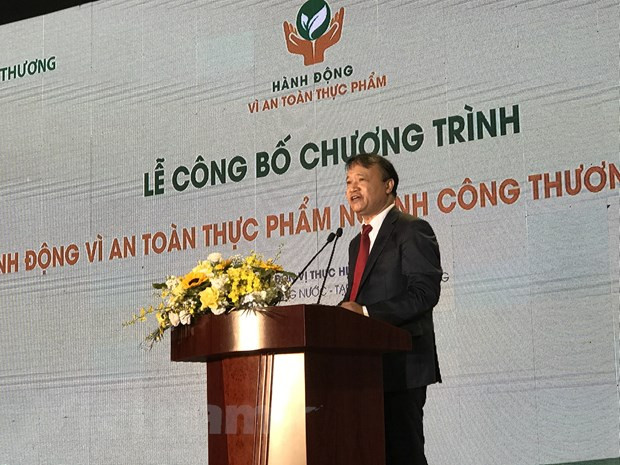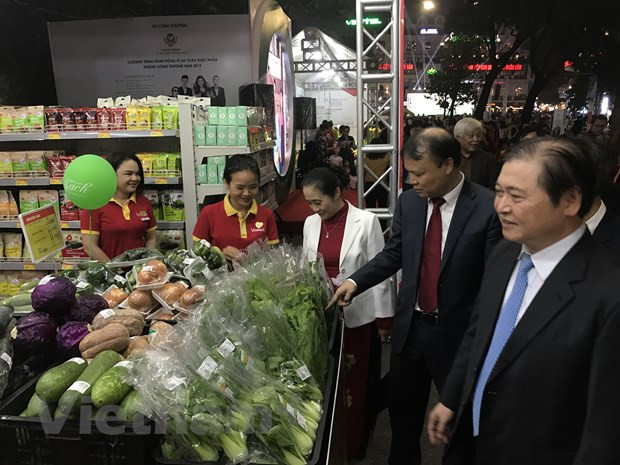Hanoi (VNA) – The Ministry of Industry and Trade on November 30 launched a programme, calling for actions to ensure food safety in the industry and trade sector.
In his remarks, Deputy Minister of Industry and Trade Do Thang Hai said the ministry has rolled out various solutions in an effort to build and develop a safe food market, while assisting food enterprises to promote their brands.
Besides, the ministry has applied advanced management methods, provided consultations for businesses to pilot the model of markets with safe food, and organised activities to boost exports, he said.
To prevent the production and trading of counterfeit, low-quality and smuggled food, the ministry is perfecting relevant policies and laws, intensifying inspections and stepping up the communication work to raise public awareness of food safety, the official added.
Under the programme, thousands of volunteers delivered leaflets and posters on food safety at convenience stores, supermarkets, traditional markets and households, aiming to lure millions of people to the programme.
Within the framework of the programme, between November 29 and December 1, many food enterprises introduced their products at the Dong Kinh Nghia Thuc Square.
Last year, market watchdogs across the country conducted more than 14,200 inspections. As many as 8,400 cases were fined a total of 19.5 billion VND (839,800 USD).
Environmental police also discovered more than 6,100 food-safety violations. More than 5,000 individuals and more than 800 organisations were punished.
In the first six months of the year, market watchdogs handled more than 56,000 facility owners who violated food safety regulations out of the 347,000 facilities inspected.
The Ministry of Health and authorities in 63 provinces and cities imposed total administrative fines of 24 billion VND (1.05 million USD) on 8,400 facility owners in the food sales and production sector.
The ministry has also been piloting an online system for food safety information and management in order to avoid inaccuracies and slack updates on food safety data like food poisoning and management violations. The ministries of agriculture and trade are now working on the completion of the system.
According to the World Bank, the leading cause for food-related diseases in Vietnam is bacterial contamination, but high use of chemicals in agricultural production such as antibiotics, pesticides and inorganic fertilisers are also a problem.
The National Action Month on Food Safety took place from April 15 to May 15 with the theme of “Say no to fake and substandard food and protect customers’ rights”.
The action month's activities included an education campaign calling on everyone to obey food-safety regulations in food production and trading.
All people in the country should be proactive in preventing food pollution to limit the number of food poisoning cases and the spread of disease via unsafe food, the National Steering Committee on Food Safety and Hygiene said.
The People’s Committees at different levels should give guidance and assign more teams to inspect food safety and improve coordination between local authorities and social organisations in ensuring food safety and hygiene, it added.
A report by the Ministry of Industry and Trade said that all provinces had been developing standardised food supply chains. More than 1,200 agriculture supply chains had been set up with more than 3,100 showrooms.
Conferences and training on food safety had been organised for more than 35,000 individuals involved in food sales and production. Inspection teams specialising in food safety had also been trained by the Ministry of Health in nine provinces and cities.
There are currently 182 food safety and hygiene testing units nationwide, run by the health and agriculture ministries.
A survey by the market research firm Indochina Research earlier this year revealed that food safety was among the issues that concerned urban Vietnamese people the most.
The survey, which interviewed more than 300 people aged 18 to 60 in the country's biggest cities Hanoi and Ho Chi Minh City, said 86 percent identified food safety as the most pressing social concern./.






























